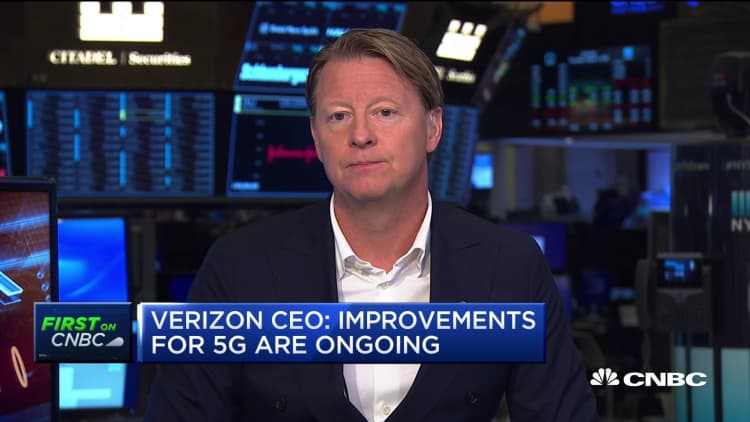At first blush, inventing a start-up to challenge AT&T, Verizon and Comcast for high-speed broadband dominance seems crazy.
It takes billions of dollars to lay fiber in the ground — historically, the only way to deliver ultrafast internet speeds to residential homes. The prohibitive cost has stopped some of the largest companies in the world from making a national dent in constructing high-speed broadband networks, including Verizon and Google. Meanwhile, Verizon and AT&T already plan to roll out 5G fixed broadband services in cities across the U.S., using wireless technology to compete with cable companies to provide home internet.
But Zach Brock, the CEO of Common Networks, a company he founded with three other ex-Square employees, said he believes he has helped design a technology that can upend the U.S. telecommunications market. For about $50 a month, Common Networks is offering 300Mb/sec to 1Gb/sec download speeds for households around Silicon Valley and Alameda (Oakland is coming soon). That's about $20 or $30 less per month than what Comcast charges for about the same speed without promotional pricing.
"Our focus is proving out of technology and showing we can deliver at an affordable cost," Brock said in an interview. "Our vision for the company is that everyone is connected to true broadband internet."
Partnership with Facebook technology
Common Networks, founded about three and a half years ago, leases existing fiber and uses unlicensed 5G microwave and millimeter spectrum to interact with its antenna-like devices that are installed on rooftops. Using open-source software and hardware, through a partnership with Facebook's Terragraph technology, Common Networks developed so-called graph-based technology that can deliver high-speed internet for what Brock said is about one-tenth the cost of what a telecommunications company has historically paid. To date Common Networks claims to reach more than 100,000 customers, though the company doesn't disclose its paying subscriber numbers.
The technology's prospects have been strong enough to bring in $34 million in funding from venture capital investors including General Catalyst, Eclipse Ventures and Lux Capital. On Tuesday the company made the 2019 CNBC's Upstart 100 list of the world's most promising start-ups.
Brock said his initial focus is single-family homes that don't have high-speed broadband options or have to rely on old DSL technology for Internet. Perhaps surprisingly, more than 22% of residents in San Leandro, California — one of five cities Common Networks currently serves — don't have a home broadband subscription of any kind. Cable companies often choose not to spend the money to connect buildings or regions of the country where they expect minimal customer retention.
"For many it may be likely that residential broadband internet is either not available or is not affordable," Magellan Advisors wrote in a review of the city's internet usage and capabilities.
More from Upstart 100:
Amazon has triggered an arms race in this technology
Why Kevin Durant and other NBA stars are betting millions on a start-up to challenge TV sports
Ahead of 2020 presidential election, this start-up is using military-grade AI to stamp out fake news
Getting a foothold into homes that want broadband but can't access it may be the easiest path for the start-up, but the ultimate goal is to compete head-to-head against both cable companies and wireless providers, Brock said. Distributing broadband can be a very high-margin business, as most of the cost is fixed network infrastructure and upkeep. Cable companies, such as Comcast and Charter Communications, the two largest U.S. operators, have shifted their business models to invest billions of dollars in boosting nationwide speeds while spending less effort keeping traditional television subscribers.
"Providing internet service is a very large market," said Kyle Doherty, a managing director at General Catalyst, whose venture capital firm led a $25 million Series B funding round in Common Networks last year. "High-speed broadband still isn't ubiquitous, but it will be in the future. There's a fair share of incumbents, but we're pretty compelled by the approach they're taking."
Common Networks doesn't lay any fiber nor does it need government permits to provide internet. Eschewing the enormous upfront costs of broadband infrastructure gives the company a chance to compete against much larger players if pricing is lower and customer service is dramatically better, said Doherty.
High-speed broadband still isn't ubiquitous, but it will be in the future. There's a fair share of incumbents, but we're pretty compelled by the approach they're taking.Kyle Dohertymanaging director, General Catalyst
Still, it remains to be seen how quickly Common Networks can provide its technology outside of the San Francisco Bay Area. Regulations in certain cities could delay expansion, and being first to market is an important advantage for Common Networks, Doherty said.
Verizon's 5G Home Internet is currently available in limited areas of Los Angeles, Sacramento, Houston and Indianapolis. Verizon is charging the same $50-per-month price for households with a Verizon wireless account and $70 per month for homes that don't. Verizon is also giving away the first three months of home Internet for free.
Still, the technology needs to work reliably in all neighborhoods, said telecommunications analyst Craig Moffett of MoffettNathanson. Architectures based on millimeter wave spectrum suffer from wave-strength issues, he said.
"The signal doesn't travel far enough, or penetrate through obstructions well enough, to make it economically interesting," Moffett said.
But Common Networks "may have a better story to tell than the larger incumbents" because they're "all about keeping costs down," said Moffett, citing the company's use of unlicensed spectrum and limited spending on traditional network facilities.
"It's not clear how successful companies like Common Networks will be competing against the large incumbent ISPs, but there's certainly a place for them in the broadband landscape," Moffett said. "I think you'll see more and more companies like Common Networks."
Capitalizing on poor customer service
Brock and his fellow former Square co-workers — Grace Chen, Mark Jen and Jessica Shalek — were drawn to internet distribution because cable companies have scored poorly in customer service satisfaction surveys for decades.
"There's a clear problem to solve," Brock said.
Part of the company's pitch to consumers is to be the anti-cable company in terms of customer relationships, Doherty said. Stressing the importance of the first installation, Common Networks technicians, who are all full-time employees, are trained to make a positive first impression with customers to spread word-of-mouth buzz about the company. Still, the company's primary selling point will be underpricing its competition because of the company's proprietary technology, Brock said.
Convincing customers to choose a start-up over a widely known incumbent's service will be a challenge. Brock and his team are trying to market Common Networks' service locally, going door-to-door and working with city government officials to participate in local events to spread the word.
"It's very local, and it's effective," Doherty said. "There are a lot of levers to pull, getting positive press in local newspapers and using door hangers. It's old-fashioned, but people are looking for a cheaper experience."
Disclosure: Comcast owns NBCUniversal, the parent company of CNBC.
WATCH: Verizon CEO Hans Vestberg: Half of the US will have 5G phones by 2024







